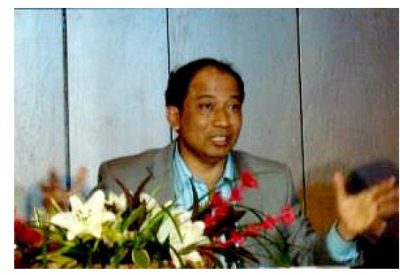| |
.
.
|
|
A
challenge to Filipinos
|
|
from
NAMFREL Election Monitor Vol.2, No.20
|
|
. |
In his lecture on September 2 entitled
"Creating Paths for Sustainable Citizen Vigilance In a Young
Democracy," Ramon Magsaysay awardee Koul Panha of Cambodia stressed
the importance of citizens participation -- not just in safeguarding
the electoral process, but more importantly, in monitoring the
performance of elected officials -- to ensure that democracy is
alive and working. Mr. Panha is the Executive Director of Cambodia's
Committee for Free and Fair Elections, a non-partisan network of
civil society organizations that work for free and fair elections
and good governance in Cambodia.
COMFREL's birth and its goals and activities are a response to the
numerous challenges that Cambodia has been facing in the slow
road to democratization, which began only roughly 20 years ago. In
his lecture, Mr. Panha outlined some of these challenges:
. |
 |
Dominance of one political
party, not just in the executive and legislative branches,
but also in the judiciary, law enforcement, armed forces,
and public administration. Though Mr. Panha looks positively
at the participation of numerous political parties in
Cambodia's elections in their local councils (called
communes or sangkats), he laments that the formula for
allocating seats does not encourage small parties, and
instead favor the dominant political party. |
 |
No "clear, democratic
procedures" in choosing the candidates to be fielded by
parties |
 |
Lack of access to information
on campaign finance |
 |
Use of state resources in
election campaigns |
 |
Lack of will to acknowledge
and resolve election violations expeditiously and justly |
 |
Marginalization of women |
 |
Little free flow of
information and government censorship of information,
discouraging public participation in discussions on issues |
 |
Weak institutions and limited
mechanisms for accountability contributing to high levels of
corruption |
 |
Partiality of institutions
such as the courts and the election commission, the military
and the police, resulting to mistrust and confidence among
the general public |
 |
Use by the government of
ill-defined laws to silence critics |
|
In response to these challenges, COMFREL set out to achieve
their goals of helping create an informed and favorable
climate for free and fair elections, and encouraging
citizens to participate in democratic governance and
decision making in order to implement reforms and increase
accountability of elected officials.
During election periods, COMFREL deploys long-term and
short-term local observers throughout Cambodia to monitor
the conduct of the elections. It also conducts parallel vote
tabulation/quick count that is also used to verify the
announced election results and detect possible fraud
patterns. COMFREL also conducts surveys to verify and assess
the accuracy of the voters list, and does voters education
through production and distribution of voters education
materials, among other activities. |
 |
|
Mr. Panha also described COMFREL's
activities in between elections. One of the most significant among
their projects is Parliamentary Watch, for which COMFREL deploys a
team to monitor the field visits of members of parliament, and
another team to sit on National Assembly sessions to observe the
activities, pronouncements and actions of the members of parliament.
COMFREL also helps organize local public forums, encouraging
citizens to engage elected officials in dialogues. Some of the
participants became members of local watchdogs that monitor
performance of elected officials at the local level. COMFREL also
has a radio program through which they disseminate information and
gather public support for reforms advocacy.
The Cambodian experience in democratization is strikingly similar to
the Philippine experience after EDSA, and Mr. Panha's and COMFREL's
response to the challenges are not unlike those of Filipino civil
society organizations' like Namfrel. In a dialogue with local
election monitoring organizations also on September 2, Mr. Panha
acknowledged that Namfrel and its activities with regard election
monitoring and seeking accountability from elected officials was
what inspired him to do the same in Cambodia.
However, more significantly, it is also clear that most of the
challenges that are besetting the young democracy that is Cambodia
are still very much present in the Philippines. The recognition
given Mr. Panha, as well as COMFREL's work, are a reminder to
Filipinos that there is still much work to be done to nurture and
safeguard democracy in the country, and that the only way Filipinos
could move forward and overcome the challenges is to be informed, to
unite, and to demand accountability from public officials and to
ensure that democratic principles are upheld. |
|
|
| |
.
.
. |
|
| |
| |
|
|

